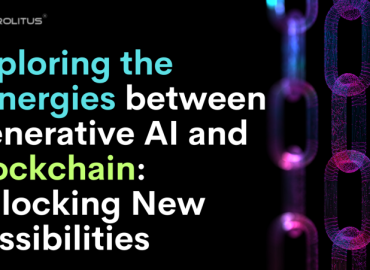It has been more than a decade since the first ever blockchain called Bitcoin was launched, and in the recent few years, according to the statistics, the blockchain market has a total of 90 Billion dollars.
At the Enterprise level, blockchain has proven to be phenomenal as it has brought a lot of use cases that have brought a paradigm shift in how companies used to operate. So, if you are a company owner and want to leverage blockchain, then you are at the right place; in this blog, we will discuss Enterprise blockchain in detail.
Important facts one should know about Enterprise level blockchain
There are a lot of use cases in the enterprise ecosystem that fulfills the gaps and holes in the company’s operation. And here are the top 5 important facts.
- In developed companies like North America, blockchain has made its way into most industries, and the overall contribution of North America in the global rise of blockchain is nearly 46 percent.
- The blockchain market is expected to grow nearly 12 folds in the upcoming years. It is expected by 2025; the blockchain market will be worth USD 39.7 Billion USD.
- According to PriceWaterHouse Coopers, the blockchain GDB would be approximately USD 1.76 trillion by 2030, contributing 1.4 percent to the global GDP.
- In total, there are more than 700 million transactions on both public Blockchains and enterprise-level blockchains, as per the statistics by Blockchain.com.
What is Enterprise Level blockchain?
Enterprise-level blockchain technology helps you to achieve secure ways of conducting business operations and brings more transparency among coworkers and management.
Unlike Public blockchains like Ethereum and Bitcoin, these blockchains are designed for conducting large numbers of transactions in less time and also offer tailormade access control management; for example, you can control who can be part of that blockchain.
Features that make the blockchain suitable for Enterprise level solutions.
There are four primary features that every enterprise-level blockchain should have. And those four features are
- Throughput time
- Operational cost
- Security
- Privacy.
For any enterprise-level blockchain, these are the expected requirements to build solutions for your company. In the following section, we will discuss each feature in detail.
Throughput time
The amount of transactions happening in a blockchain differs between public and permission blockchains and enterprise-level blockchains. In the case of private blockchains, the transactions are scalable, and there are limited nodes that participate in the consensus mechanism.
Operational cost
Operational cost is one of the essential elements for any scale business. However, many enterprises ensure that operational costs are low and easy to manage. Hence blockchain-based solutions must be cost-effective and have a calculable transaction fee.
Privacy
In a public blockchain like Ethereum and Bitcoin Blockchain, data is accessible to everyone. However, Enterprise level blockchains offer information access to only specific people with certain permissions. Also, there are certain rules that users must adhere to use any data or information.
For blockchain to offer solutions for all industries, it is essential to have a proper mechanism for access control to the information. Ideally, when used in a business setup, the technology should have certain features that do the due diligence and access control of the data.
Security
Lastly, security is another crucial factor that makes the enterprise-level blockchain suitable. With AML and KYC norms, it becomes easy to maintain the security of the blockchain network, unlike public blockchains, where all these norms are optional.
While blockchain is architected in such a way that it offers tightened security and hack-proof design, when the information is entirely private and confidential, it becomes quite essential to amalgamate the next level of security for a business-level solution.
Some of the famous Enterprise level blockchains are the following
Hyperledger Sawtooth
Hyperledger Sawtooth Platform is one of the most popular enterprise-level blockchains that offers a modular architecture that can be easily used as the building blocks for building the architecture. In addition, many enterprises use Hyperledger Sawtooth to create smart contracts that cater to the business needs of the people.
Further, this blockchain can be integrated with any consensus algorithm, such as Proof of Elapse Time and Practical Byzantine Fault tolerance. Some standard features of Hyperledger blockchain are Evm compatibility, a Pluggable consensus algorithm, and a private network with complete access control.
XDC Network
XDC network is a hybrid blockchain specifically for financing and trading activities. It is the amalgamation of private and public blockchain platforms through smart contracts interacting with each other.
XDC offers numerous features such as interoperability, tokenization, and regulated transactions of businesses. In addition, developers and companies can use the XDC network by leveraging FX infrastructure. Currently, it offers a Delegated Proof of Stake consensus algorithm.
Corda
If you are looking for an open-source blockchain and want to customize it based on your specific needs, then Corda is one of the best choices. This blockchain platform offers smart contract integrations and highly private infrastructure. That is cost-efficient and efficiently streamlines the businesses.
Moreover, it also helps businesses to fasten their time to market and maximize their ROI by providing functionality such as BFT(byzantine Fault Tolerance) consensus algorithm. A lot of tech giants like Microsoft and Intel use this blockchain network.
Quorum
It is an Ethereum-based permissioned blockchain platform with a switch kind of features to use private or public transactions. Many companies find this to be the ideal blockchain because it makes it easy for developers to build a solution without compromising the security and privacy of the network.
Recently, Quorum has become part of various industries offering decentralized platforms and building products like automobiles and electronic Devices.
Industries where Enterprise level blockchain has made significant progress
Media And Entertainment
This is one such industry that is emerging with time. Currently, the media industry uses blockchain to correctly distribute royalty for various streaming services, music, movies, and much more. Further, with blockchain, companies have achieved a new business model that caters to the need of consumers and service providers. One such good example is the use of NFTs to distribute music and artwork royalty.
Supply Chain and Logistics
It has been a long time since blockchain was used in the supply chain and logistics industry. However, with the help of blockchains, companies have enabled faster and more cost-efficient delivery of products to end customers.
Some common use cases of Blockchain in Supply Chain and Logistics are the following, Block Freight, Sync, SweetBridge, and much more. Also, companies can now build a better global economy with enhanced performance.
Retail
In the retail Industry, Walmart is one such company that uses blockchain technology to track the origin and the complete movement of porks. This is just one example; blockchain in the retail industry opens up new opportunities to construct new business modules revolving around supply chain management.
A private blockchain helps companies to track and authenticate the quality of the product in the supply chains and much more.
Automobiles
Many automobile companies use blockchain technology to refine the complete process of delivering and manufacturing new models of cars. For example, companies like Renault and Volkswagen have built a PoCS to track vehicle delivery.
At the enterprise level, Blockchain in the automotive industry can be used in different areas, like it can be used for self-driving cars to make the transmission of data secure and track all the factors such as repair history, engine usage, mileage data of the vehicle, and much more.
All these Industries are just a few examples; Enterprise level blockchain can be used for many more use cases.
Why should you hire Prolitus for your blockchain development services?
Prolitus provides a holistic approach and complete blockchain solution for all clients. It has a suite of industry-leading tools for analyzing blockchain security. Their experienced team offers a hands-on review and focuses on delivering quality products.
Prolitus has helped numerous enterprises safeguard their investments by giving foolproof security audits. In addition, it offers round-the-clock support to help you streamline business processes.
Get in touch with our team to learn more about blockchain development services.
Final Thought
If you want to build and deploy an enterprise-level blockchain solution, you should take the help of blockchain development agencies and experienced developers. Such companies hold expertise in catering to the needs of any industry.
Also, if we look at the innovation rate, the blockchain has been able to leave its footprints in many industries with a fast pace of development and innovation in architectural design. As a result, a lot of enterprise-level companies are now able to construct scalable blockchain applications.





